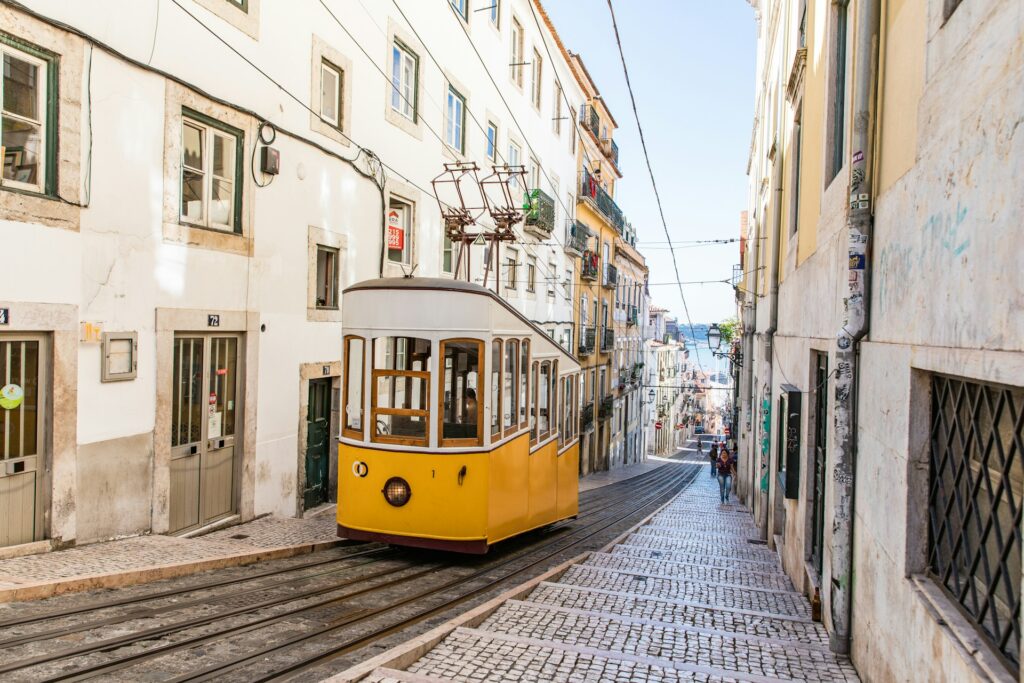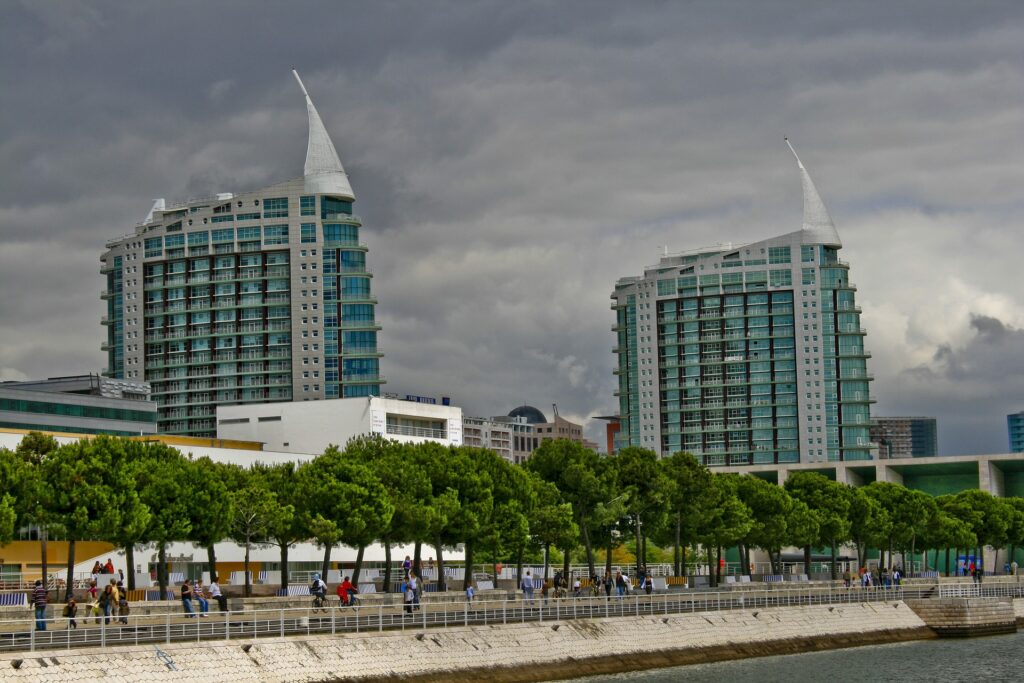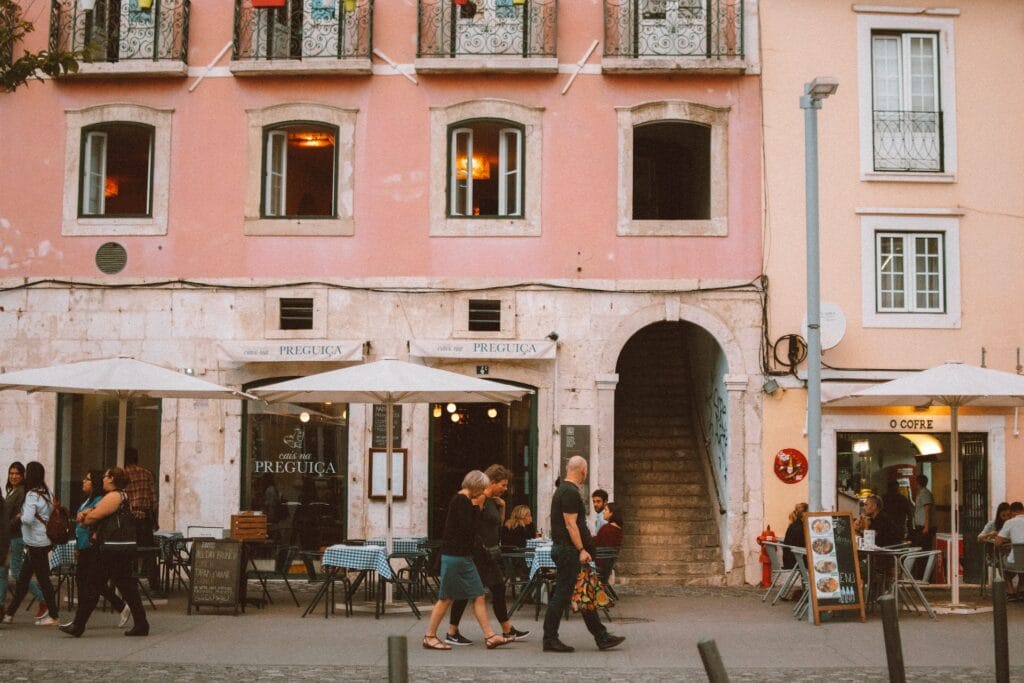When visiting Lisbon, one of the first things travelers need to handle is getting the local currency – euros. Whether it’s to pay for a coffee at a small café, buy tram tickets, or tip a helpful guide, having cash on hand is still useful in many situations. While most places in Lisbon do accept cards, there are times when cash is simply easier or even necessary.
However, exchanging money in a new city isn’t always simple. Many tourists unknowingly lose money due to poor exchange rates, hidden charges, or high commission fees. Others fall into traps like street vendors offering “better deals” or exchange booths that display unclear pricing. These problems can turn a smooth trip into a frustrating one.
That’s why this guide is important. It helps you understand the best places to exchange money in Lisbon without losing a chunk of your travel budget. From reliable currency shops to smart ATM usage, we’ll break it down in plain words. You’ll find out where to go, what to avoid, and how to keep more money in your pocket. After all, every euro saved is another pastel de nata you can enjoy in this beautiful city.
Should You Exchange Money Before You Land in Lisbon?
This is one of the most common questions people ask when planning a trip to Lisbon. The answer depends on your travel style, comfort level, and how much time you have. Exchanging a small amount of money before your flight can be a good idea. It gives you peace of mind, especially if you need to pay for a taxi, grab a snack at the airport, or tip someone after arrival. Even just 50 to 100 euros can be enough to get started.
That said, converting a large amount of money in your home country isn’t always the best move. Local banks or currency exchange kiosks at home might not give you the best rates. On top of that, some places charge fees or add a commission that eats into your money.
Lisbon has several safe and tourist-friendly places where you can exchange currency at a better rate. Many travelers find it smarter to wait until they arrive and then go to a trusted currency shop or use a no-fee ATM in the city.
It’s no surprise that VisaGuide.World recently ranked Lisbon as the best capital to visit in Europe, highlighting how much people love the city for its beauty, safety, and value. So, while Lisbon welcomes tourists warmly, being smart with your money from the start helps you enjoy more of what the city has to offer.
So, the smart choice? Bring a small amount of euros with you for day one, then take your time to exchange more once you settle in.

Airport Exchange Counters in Lisbon: Good or Bad?
The Guardian reports Lisbon the best-value location for a European city break. So, when you land at Lisbon Airport, you’ll notice several currency exchange counters, such as Unicâmbio and Santander, strategically placed for travelers needing euros. While these services offer convenience, it’s important to consider their cost-effectiveness.
Convenience vs. Cost
Airport exchange counters are designed for quick transactions, catering to travelers who need immediate cash. However, this convenience often comes at a price. These counters typically offer less favorable exchange rates compared to city-based options and may include additional service fees.
Understanding the Rates
Some airport services advertise “0% commission,” but this can be misleading. Instead of charging a visible fee, they might offer a lower exchange rate, effectively increasing the cost of your transaction.
Alternative Options
Many travelers recommend using ATMs affiliated with Portuguese banks, known as Multibanco, which generally offer better exchange rates and lower fees. It’s advisable to avoid Euronet ATMs, as they are known for higher fees and less favorable rates.
Pro tip: If you need a small amount of cash upon arrival for immediate expenses like transportation or snacks, using an airport exchange counter can be acceptable. However, for larger sums, it’s more economical to wait until you’re in the city to exchange money or withdraw cash from a reputable ATM.
Best Currency Exchange Shops in Lisbon
When visiting Lisbon, exchanging currency at reputable shops can help you get better rates and avoid unnecessary fees. Here are some of the top currency exchange shops in Lisbon.
1. Nova Câmbios
- Location: Nova Câmbios has multiple branches across Lisbon, including one at Calçada do Carmo, 6-1D, 1200-091 Lisboa.
- Opening Hours: Most branches operate from 9:00 AM to 7:00 PM, Monday to Saturday.
- Rates: Nova Câmbios offers competitive rates with no commission fees.
- What Makes It Better: With over 100 branches worldwide, Nova Câmbios provides a wide range of currencies and transparent pricing.
- How to Find It and What to Bring: Use their store locator to find the nearest branch. Bring a valid ID for transactions.
2. Unicâmbio
- Location: Unicâmbio operates over 80 counters throughout Portugal, including several in Lisbon.
- Opening Hours: Typically open from 9:00 AM to 6:00 PM, Monday to Friday. Some branches may have extended hours.
- Rates: Known for transparent rates, Unicâmbio provides clear information on exchange rates and fees .
- Extra Tip: Check their online rate before visiting to ensure you get the best deal.
3. Exchange Corner (Baixa-Chiado Area)
- Location: Located in the Baixa-Chiado area, a central and tourist-friendly part of Lisbon.
- Opening Hours: Generally open from 9:00 AM to 7:00 PM, Monday to Saturday.
- Rates: Often offers lower fees than airport counters, making it a cost-effective option for travelers.
- What Makes It Better: Despite its small size, Exchange Corner is well-rated by visitors for its friendly service and transparent rates.
- Staff: The staff speaks English, which can be helpful for non-Portuguese speakers.
4. EuroCambio
- Location: EuroCambio is situated close to Rossio Square, a central location in Lisbon.
- Opening Hours: Typically open from 9:00 AM to 6:00 PM, Monday to Friday.
- Rates: Frequently mentioned in travel forums for offering competitive exchange rates.
- What Makes It Better: EuroCambio accepts debit cards and has clear signage, making transactions straightforward for travelers.
- Pro Tip: When exchanging currency in Lisbon, it’s advisable to compare rates and fees at different locations. Always bring a valid ID, and consider checking online rates beforehand to ensure you’re getting the best deal.

Using Banks in Lisbon for Currency Exchange
Many travelers consider using banks in Lisbon to exchange money, thinking it might be a safer or more trustworthy option. And that’s partly true. Banks are regulated institutions, so you can expect transparency and security during your transaction. But when it comes to getting the best value, there are a few things you should know.
First, not all banks in Lisbon offer currency exchange for tourists. Some may only provide this service to account holders. It’s always best to check in advance or ask the front desk of your hotel to call and confirm. Larger banks like Caixa Geral de Depósitos, Millennium BCP, and Novo Banco are more likely to handle currency exchange for travelers.
The biggest downside of using banks is the limited opening hours. Most close by 3:00 PM and are not open on weekends. So if you arrive late or during a holiday, banks may not be a practical choice.
Rates at banks can be decent, but they are not always better than those at specialized exchange offices in the city. Some banks may also charge a small commission or service fee, especially if you’re not an account holder.
If you decide to use a bank, carry your passport or official ID, as they will usually ask for it. It’s also helpful to know how much you want to exchange ahead of time to speed things up.
In short, banks in Lisbon are safe for currency exchange, but not always the most convenient or cost-effective option.
Can You Exchange Money at Hotels in Lisbon?
Yes, many hotels in Lisbon offer currency exchange services at the reception desk. This is often the easiest and quickest option for travelers who want to get some euros without stepping outside. It’s a good choice if you need a small amount of cash right away—for tipping, transport, or snacks.
However, hotel exchange rates are usually not the best. Hotels may charge more for the convenience they offer. They often apply a higher margin between the buy and sell rate, which means you end up getting fewer euros for your money. Also, the variety of currencies they accept may be limited.
Another thing to keep in mind is that not all hotels offer this service. It’s more common in larger or luxury hotels, especially those located in tourist areas. Smaller guest houses or apartments may not provide any exchange options at all.
If you do want to exchange money at your hotel, ask the front desk if there are any extra charges or hidden fees. You can also compare their rates with nearby exchange shops or banks to decide what’s best.
In short, hotel exchanges are fine for quick cash, but not ideal for exchanging large amounts.

Using ATMs to Get Euros in Lisbon
Using ATMs is one of the most convenient ways to get euros while in Lisbon. They’re easy to find, work 24/7, and often give better exchange rates compared to airport counters or hotel desks. But there are some things to watch out for to avoid paying extra fees.
In Portugal, the local ATM network is called Multibanco, and it’s known for being safe and reliable. These machines are operated by local banks like Caixa Geral de Depósitos, Banco BPI, and Novo Banco. When you use ATMs from these banks, you’re more likely to get a fair rate with minimal fees.
However, it’s important to avoid Euronet ATMs. These are independent machines found in tourist areas, and they often charge high withdrawal fees or offer poor exchange rates. They also use something called “Dynamic Currency Conversion” (DCC), which lets you see your balance in your home currency. This may sound helpful, but it usually comes with a worse rate than if you choose to be charged in euros.
Here’s a quick tip: always choose to be charged in euros, not your home currency, when the ATM asks. Also, check with your bank at home before you travel. Some banks partner with international networks and waive foreign ATM fees.
In short, ATMs are a smart way to get euros in Lisbon: just be sure to use the right ones and make smart choices during your transaction. That way, you’ll get more money in your wallet and fewer surprises on your bank statement.
Digital Options: Apps and Cards That Save You Money
Here’s a breakdown of the most useful digital money tools when visiting Lisbon. These apps and cards help you avoid extra charges and get better exchange rates while still giving you full control over your spending.
Wise (formerly TransferWise)
Wise is trusted by travelers for its transparent exchange rates. You get the real mid-market rate with very low conversion fees. With a Wise debit card, you can pay at shops, restaurants, and use ATMs across Lisbon. It also lets you hold different currencies and only convert when rates are better. The app makes it easy to track your money and spending in real time.
Revolut
Revolut is ideal for short-term visitors and frequent travelers. It allows you to convert money within the app at better rates than many banks. You can pay in euros across Lisbon using contactless or chip payments. Revolut also lets you freeze your card, set limits, and receive instant alerts for each transaction, giving you better control over your spending.
N26
N26 is a full online bank that’s especially useful for longer stays. You can open an account online and get a Mastercard that works across Europe. In Lisbon, you can withdraw cash from ATMs without paying foreign transaction fees. It’s simple, safe, and works almost everywhere, from supermarkets to metro stations.
Where You Can Use Them in Lisbon: All three cards of Wise, Revolut, and N26 work widely in Lisbon. You can use them at ATMs, restaurants, stores, taxis, public transport kiosks, and even local markets that accept cards. They’re a reliable alternative to carrying large amounts of cash.

How Much Cash Should You Carry in Lisbon?
Lisbon is a modern city where cards are accepted in most places, but it’s still a good idea to carry some cash. On average, travelers spend between €40 to €70 per day, depending on their style—budget or mid-range. This includes meals, transport, attractions, and snacks.
Most restaurants, shops, and public transport kiosks accept debit or credit cards. Larger stores and chain cafés rarely have issues. However, you’ll still come across places where cash is preferred or even required. These include small local cafés, family-run shops, flea markets, and street vendors.
Cash is also helpful for tipping – even though tipping isn’t mandatory in Portugal, it’s polite to leave a euro or two for good service. If you’re using taxis or rideshares, some drivers prefer cash, especially if the fare is small.
As a rule of thumb, carrying €50 to €100 in cash should be enough for daily use. You can always withdraw more from a nearby ATM if needed. Just avoid carrying large sums, and keep your money in different places to stay safe.
Lisbon Neighborhood Guide: Where to Find Fair Exchange Rates
Lisbon is a city of charming neighborhoods, each with its own character and convenience. When it comes to finding good places to exchange money, some areas are far better than others. Here’s a guide to help you pick the right spot, based on safety, rates, and ease of access.
Baixa-Chiado is the most tourist-friendly area in the city. Located in downtown Lisbon, it’s filled with shops, cafes, and historic streets. You’ll find several well-rated exchange counters here offering decent rates and low fees. Because it’s such a popular spot, businesses compete for travelers, which helps keep exchange margins more honest.
Avenida da Liberdade is a high-end boulevard known for luxury stores and fine dining. Currency exchange options here are limited, but the few that do exist are usually reliable and transparent. If you’re nearby, it’s a good place for quick and safe currency conversion.
Alfama and Bairro Alto are older, more traditional neighborhoods. Exchange counters are harder to find, but you might come across one near popular viewpoints or tram stops. Better to use ATMs here, or exchange in central areas before visiting.
Oriente/Gare do Oriente is a major train and metro hub. You’ll find ATMs and a few counters, but double-check fees before using them, especially inside shopping centers.

How Can We Assist you
If you’re planning to stay long-term in Lisbon under a visa—whether it’s the D7, student visa, or a digital nomad permit—our immigration business partner, Portugal Residency Advisors®, can support you every step of the way. They also act as an independent buyer’s agent, helping you identify the best property options for purchase or simply secure a long-term lease that fits your needs.
In addition to housing support, their team offers comprehensive relocation services, covering everything from visa documentation to local registrations. With experience assisting digital nomads, retirees, students, and families, they ensure a smooth and stress-free transition for anyone starting a new chapter in Portugal.
Looking to Invest in Portugal?
Explore our newest listings below!
Frequently Asked Questions About best places to exchanged money in lisbon
Where is the best place to exchange money in Lisbon?
The best places to exchange money in Lisbon are trusted currency exchange shops like Nova Câmbios, Unicâmbio, or Exchange Corner in the Baixa-Chiado area. They offer fair rates and clear fee structures.
Are airport exchange counters in Lisbon a good choice?
They’re convenient but usually offer poor exchange rates with hidden fees. It’s okay for small amounts, but it’s better to use ATMs or city-based exchange shops for better value.
Can I use my home country debit card in Lisbon?
Yes, most international debit cards work at ATMs in Lisbon. Just make sure your bank has enabled international use and be aware of foreign transaction or withdrawal fees.
Are there any hidden fees at ATMs in Lisbon?
Local bank ATMs (Multibanco) usually have low fees. Avoid Euronet ATMs, which often charge high service fees and offer poor currency conversion rates.
Should I bring euros from home or exchange in Lisbon?
Bring a small amount (around €50–€100) for your first day. After that, it’s usually cheaper to exchange or withdraw euros once you’re in the city.
Do hotels in Lisbon exchange currency?
Some hotels offer exchange services, but their rates are often not great. It’s best for quick cash only. For larger amounts, go to a proper exchange shop.
Is it better to pay in euros or my home currency?
Always choose to pay in euros. Paying in your home currency may trigger Dynamic Currency Conversion, which gives you a worse exchange rate.
How much cash should I carry daily in Lisbon?
Carrying €50–€100 is enough for daily needs. Most places accept cards, but cash is handy for small cafés, tips, and public transport.
Do I need ID to exchange money in Lisbon?
Yes, most exchange counters and banks will ask for a valid passport or ID card, especially for larger amounts.
